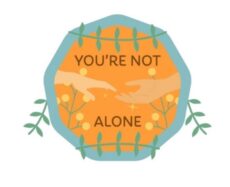
I find myself wondering more and more lately – why is it so challenging for so many of us to ask for help and accept help when it is offered to us.
Why is it that so many of us perceive it as a sign of weakness? A sign of neediness? A sign of lacking? Lacking in strength, lacking in knowledge, lacking in power, lacking in fortitude and perseverance? Is this why we may try to silence our needs, make our needs invisible, shut ourselves up? Because we do not wish to appear less than?
I know it took me a very long time to come to terms with my own humanity. What did that mean? For me it meant accepting the fact that I do NOT actually have to power through no matter what and fail if I didn’t. Also, that failure (at anything really) is not shameful or the end of the world. And does not define me. When I was on this empowering journey of self-discovery, I stumbled on an acronym for failure that went something like this – First Attempt In Learning. How profound is this? We are all always a work in progress. We will stumble. We will even fall – sometimes on our face, sometimes on our bum, and it will always be painful and possibly humiliating. But what matters is what you do after the fall. Do we crumble? Do we crawl into a hole and hide from the rest of the world desperately trying to pretend the fall did not happen? Or do we learn from the experience?
No matter what your answer – you will never hear any judgement from me! Chances are I have been where you are and felt what you feel. I have definitely stumbled and fell more times than I care to remember and my responses to the experience were not always dignified or graceful. Because the fear is real. The fear of judgement. The fear of humiliation. The fear of rejection. The fear of disappointment (disappointing self, parents, lovers, children, management, clients – circle all appropriate or pick your own). The list can go on. At the end of the day fear is the most basic of feelings, the original driver, the reason humanity survived for as long as it did. A healthy level of fear is necessary. But when does it become counterproductive?
Well – you tell me! Quite probably this is my answer – the reason a lot of us are self-conscious, anxious to ask for help is FEAR. We are afraid of being perceived a certain way. And this is perfectly natural, normal.
With all this in mind – how do you answer this question “do I need help?”
Here is a little checklist for you – you will benefit from some form of help if you ever:
- Feel overwhelmed by daily activities, like cleaning, cooking, showering, basic self-care
- Feel like nobody understands you – how you feel, what you are going through
- Feel sad for no apparent reason
- Want to escape it all but not sure how or what that means exactly
- Feel hopeless
- Feel helpless
- Find your reality daunting
- Feel anxious at the thought of needing to complete a task (an assignment due, a project deadline coming up, an important date, an interview, etc)
- Feel like if you do not do a task right now something horrible will happen to either yourself or your loved ones
- Feel ashamed of the thought of not completing something on time
What do I mean by HELP? Does it mean that you need professional intervention? Not necessarily. Not always. Sometimes it is enough to simply acknowledge your own humanity and give in to the idea that not everyone in your orbit is out to get you, some of them genuinely want and can help. And help means different things to different people at different times – for example, you can acknowledge the fact that you are not good at maths, nor do you enjoy administrative/organisational tasks and make an appointment to see an accountant to help with your tax return or invoicing/bookkeeping. Or, you can resign yourself to the fact that computers/tech things are not your strong suit and ask your partner, who works in IT to help build your website/fix your phone/adjust the cable etc. Maybe, you are not familiar with current slang/lingo and need to ask your Gen-Z children for advice.
And there are other times, of course, when you can simply reach out to whoever you feel safe around and ask them for a hug. Or, if you are a pet owner – hug your pets, play with them. Or go outside and connect with nature.
All of those require one simple step – pausing to feel. What does that mean? It means allowing yourself the space to vulnerable, to name the feeling.
And absolutely, if you do not find a simple and attainable solution in your immediate surroundings, reach out for help. Whether it is by calling 000 if you are in dire straits, or calling your therapist, or a free helpline, or making your very first counselling appointment.
What can that achieve? You can start an amazing journey of self-discovery – finding your triggers, glimmers, your unique unapologetically authentic self, what makes you happy, what makes you sad, where do you feel it all in your body, how do you feel in space and time. All of this and so much more. You set the limits. You are in charge.

